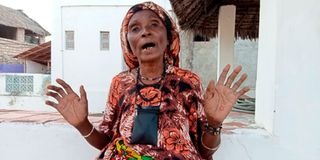Boni Forest midwives make the difference between life and death

Ms Fatma Shizo, a traditional birth attendant in Boni Forest, Lamu County.
What you need to know:
- Most villages in Boni Forest, Lamu County lack dispensaries after the facilities were closed down following frequent attacks by al-Shabaab militants.
- It is only Kiangwe in Lamu East and Pandanguo in Lamu West that are operating, though they are understaffed and have inadequate drugs.
- Pregnant women’s only option is to rely on traditional birth attendants like Ms Shizo, one of the most sought-after midwives.
In the dense Boni Forest in Lamu County, a pregnant woman groans as she goes into labour.
Next to her sits Fatma Shizo, a traditional birth attendant who touches her stomach to feel the uterus. Everything goes according to plan and the woman gives birth to a bouncing baby boy.
Ms Shizo’s delicate hands have massaged scores of other expectant mothers in far-flung villages for many years. The 70-year-old has helped deliver babies in Kiangwe, Basuba, Mararani, Milimani, Sankuri, and Mangai.
Most villages in Boni Forest lack dispensaries after the facilities were closed down following frequent attacks by al-Shabaab militants. The dispensaries were either vandalised or torched by the militants and have been closed since 2014. Medics also fled for fear of attacks, never to return.
Practising midwifery
It is only Kiangwe in Lamu East and Pandanguo in Lamu West that are operating, though they are understaffed and have inadequate drugs.
Children and pregnant women have borne the brunt of the shortages, with limited access to neonatal and postnatal clinics. The women’s only option is to rely on traditional birth attendants (TBAs) like Ms Shizo, one of the most sought-after midwives.
Born in Kiangwe village in 1951, the mother of seven started practising midwifery at the age of 20.
Ms Shizo did not go to a formal school but learnt the trade through apprenticeship.
“My grandmother was the only midwife among the Boni. I used to accompany her and watch her work,” she said. “That’s when I got interested. I used to follow her wherever she went, and sometimes she would ask me to do it under her supervision.”
2,000 children
There are only three birth attendants in Boni, Ms Shizo included. The other two live in Milimani and Basuba villages, which are miles apart.
“In the over 30 years that I have practised, I have saved the lives of many women and delivered about 2,000 children,” Ms Shizo said. She charges between Sh200 and Sh1,000 for her services.
For the very poor, she charges nothing. She wants the government and well-wishers train and equip TBAs.
She said locals would like to cross to Lamu island and deliver their babies at King Fahad County Hospital, But many cannot afford the travel costs. Ms Khadija Gurba, a women’s rights activist in Mangai, said TBAs are overwhelmed by the number of clients seeking their services.
“I feel Ms Shizo and other TBAs in Boni Forest should get special training to enable them to move with the times. This is a digital era and things should be done in a modern way,” she said. A local, Ms Maryam Sindi Kale said she gave birth to all her four children with the help of Ms Shizo.
“Daktari [Ms Shizo] is a very important figure in our villages,” she said. Basuba elder Noya Abuli wondered why the government was taking so long to reopen hospitals and dispensaries.
Trained health worker
“We were promised that our dispensaries would be reopened but nothing has materialised. I also remember that, in 2018, Governor Fahim Twaha promised to build a hospital inside Boni Forest,” Mr Abuli said.
“So far, nothing has been done.”
A 2020 study by the Kenya National Bureau of Statistics indicates that 80 per cent of rural women preferred traditional birth attendants to skilled ones.
Lamu is among the top 15 counties that contribute 98 percent of Kenya’s maternal deaths.
These deaths can be prevented through pregnancy check-ups and hospital deliveries. But, due to insecurity and the closure of health centres, most women have no choice except to deliver at home using untrained TBAs.
Although midwives like Ms Shizo are an integral part of the healthcare system, giving birth outside a hospital can be risky.
Complications can arise and, if not managed by a trained health worker, both mother and baby are at risk of death.
Obstructed labour, infections, haemorrhage, high blood pressure and other complications can be addressed in a hospital or the mother can be quickly referred to another facility for specialised care.





